|
|
|
Sort Order |
|
|
|
Items / Page
|
|
|
|
|
|
|
| Srl | Item |
| 1 |
ID:
074081
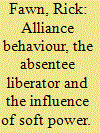

|
|
|
|
|
| Publication |
2006.
|
| Summary/Abstract |
Thirteen post-communist governments gave diplomatic support to the Anglo-American position on Iraq in 2003; many also gave military assistance to the war itself and most contributed to post-war operations. However 'small states' may be defined, none of these 13 actors can be considered a major power in international relations. This article assesses the reasons for their support of the United States. It first considers what material gains they expected and gained, and applies their support of the US against expectations of alliance behaviour. It then contrasts the behaviour of those Central and East European states with that of Belarus and of Serbia. The article then argues that an important explanation for post-communist state behaviour over Iraq comes from an expression of existential values that can be understood through the notion of 'soft power'.
|
|
|
|
|
|
|
|
|
|
|
|
|
|
|
|
| 2 |
ID:
074079
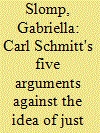

|
|
|
|
|
| Publication |
2006.
|
| Summary/Abstract |
Carl Schmitt famously alleged that a commitment to just war fosters the criminalisation and demonisation of the enemy. The aim of this paper is to trace, analyse and evaluate five arguments that can be found in Schmitt's opus elucidating and supporting the above claims. The paper suggests that even though Schmitt's critique of just war is typically extreme, it can nevertheless enrich the current debate on just war in so far as it challenges the common claim that the just war tradition occupies the middle ground between bellicism (that always justifies war) and pacifism (that never justifies war). Arguing against this widely held view, Schmitt claims that in the 20th century a belief in just war, far from representing a moderate position between extremes, is instead at the fore of an ideology that aims at dehumanising anyone who does not share its core values.
|
|
|
|
|
|
|
|
|
|
|
|
|
|
|
|
| 3 |
ID:
074084
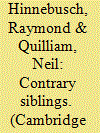

|
|
|
|
|
| Publication |
2006.
|
| Summary/Abstract |
Jordan and Syria, severed parts of the same country, were in many ways 'siblings': their systemic situation, as economically weak small states surrounded by more powerful enemies, was similarly vulnerable; their leaders at the time of the Iraq War were of a similar 'modernising' generation; the identities of their populations were similarly Arab-Islamic. Yet, they followed diametrically opposite policies toward the invasion of Iraq: Jordan bandwagoning with the United States and Syria defying it. This contrary behaviour is explained by their differential experiences of state formation and the differing social forces incorporated and identities institutionalised in Ba'thist Syria and Hashemite Jordan.
|
|
|
|
|
|
|
|
|
|
|
|
|
|
|
|
| 4 |
ID:
074075
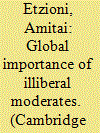

|
|
|
|
|
| Publication |
2006.
|
| Summary/Abstract |
In contrast to the claim that the most significant fault line in contemporary global affairs is between the civilisation of the West and all others, this essay argues that the schism between those who advance their values through violence and those who rely on persuasion, both of which are present in all civilisations, is the greatest source of conflict in the post-Cold-War era. Moderates come in many stripes: some are liberal, such as Reform Jews and Social Democrats, while most others are illiberal, including many Muslim religious leaders. All moderates, however, share in common a principled rejection of violence. Polls and reports from around the world bear out that a conviction of the value of persuasion over coercion does not depend on faith in democracy or secularism. The West should ally itself with such moderates, no matter how liberal or illiberal their orientation.
|
|
|
|
|
|
|
|
|
|
|
|
|
|
|
|
| 5 |
ID:
074080
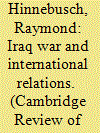

|
|
|
|
|
| Publication |
2006.
|
| Summary/Abstract |
The Iraq War exposes the new shape of world politics. It discredits the idea of a benign hegemon defending world order, content to be an 'offshore balancer', exercising its power through multinational institutions and constrained by mutually agreed rules. Rather, the hegemon, facing few external constraints in a unipolar world, is driven by the particularistic interests of its ruling group, in the pursuit of informal empire wherein military force is used to impose client regimes and economic subordination. The impotence of both a realist power balance and of liberal institutions to restrain it calls into question the main bases of global order, leaving imperial overreach as the main limitation on hegemonic power. Small states may be able to adapt to, even temporarily profit from, bandwagoning with the hegemon, but it is they that are potentially most threatened when a hegemonic power undermines the international constraints on the use of power.
|
|
|
|
|
|
|
|
|
|
|
|
|
|
|
|
| 6 |
ID:
074078
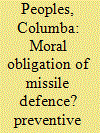

|
|
|
|
|
| Publication |
2006.
|
| Summary/Abstract |
This article aims to assess the moral arguments that have been propounded for missile defence in the post-Cold-War era and to evaluate how these relate to those made for the 'pre-emptive' use of military force. Specific attention is paid to the argument that contemporary missile defence constitutes a form of moral obligation for the United States, a position explicitly advocated by just war theorist James Turner Johnson. Drawing on critiques of similar arguments made in the 1980s, the assumptions of this position are critically assessed. Finally, the article asserts that the general reconfiguration of imminent threats in recent US security strategy gives sustenance to the moral argumentation for missile defence as much as it does the anticipatory use of force more broadly understood, indicating how the two overlap and intersect in this regard.
|
|
|
|
|
|
|
|
|
|
|
|
|
|
|
|
| 7 |
ID:
074083
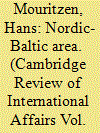

|
|
|
|
|
| Publication |
2006.
|
| Summary/Abstract |
States in the Nordic-Baltic area reacted heterogeneously to the Iraq War operation: Denmark chose to participate; Iceland, Estonia, Latvia and Lithuania supported the operation diplomatically or materially; whereas Norway, Finland and Sweden were negative. The research tool used to explain this pattern is the parsimonious theory of 'past and present geopolitics', taking issue with systemic neorealism, primarily. In spite of official rhetoric emphasizing Baghdad or New York (the UN), states' driving forces were mainly found in their different salient environments. The primary explanation, proximate power balancing, was at work regarding Denmark, Estonia, Latvia and Lithuania. Iceland, with no big neighbour, could enjoy profit bandwagoning, while Sweden and Finland followed 'standard operating procedures'. A minor aberration from expectations is noted regarding Finland: its EU balancing rather than US balancing of Russia. The Norwegian 'no' and Danish warfare were both an expression of geopolitical freedom of manoeuvre.
|
|
|
|
|
|
|
|
|
|
|
|
|
|
|
|
| 8 |
ID:
074076
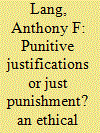

|
|
|
|
|
| Publication |
2006.
|
| Summary/Abstract |
Can the use of military force in response to violations of human rights norms be meaningfully described as 'punishment'? If so, does this form of punishment help to constitute a just and peaceful international order? This paper investigates these two questions by examining the use of strategic bombing in campaigns of coercive diplomacy as a means to punish states. The paper explores the concept of punishment and its relevance for international affairs as a theoretical basis. It then turns to two cases of punitive uses of force-US and UK strikes against Iraq in 1998 and NATO strikes against Serbia in 1999. These two military campaigns are assessed as punitive but not necessarily just in that they fail to fit within a clear, legal institutional order and confuse the agent that deserves punishment. The paper concludes by suggesting that while punishment may be necessary for a legitimate international order, current punitive actions do not support such an order.
|
|
|
|
|
|
|
|
|
|
|
|
|
|
|
|
| 9 |
ID:
074085


|
|
|
|
|
| Publication |
2006.
|
| Summary/Abstract |
This commentary critiques the nation-state framework of analysis that informs papers published by Ray Kiely, Gonzalo Pozo-Martin and Alfredo Valladão in a section appearing in the Cambridge Review of International Affairs, 19:2 (2006), on the theme of globalisation, imperialism and hegemony. Kiely, Pozo-Martin and Valladão reify the state and the inter-state system by giving them an agency independent of historical social forces. They fail to put forward a conception of agency and institutions that could address the central problematic of the political management, or rule, of global capitalism. They presuppose a state-based understanding of global politics that ignores the reality of transnational capital and transnational social forces and that reduces global capitalism to international capitalism. We should focus not on states as fictitious macro-agents but on historically changing constellations of social forces operating through multiple institutions, including state apparatuses that are themselves in a process of transformation as a consequence of collective agencies.
|
|
|
|
|
|
|
|
|
|
|
|
|
|
|
|
| 10 |
ID:
074077


|
|
|
|
|
| Publication |
2006.
|
| Summary/Abstract |
This article examines the arguments pertaining to punitive war presented by President George W Bush, Prime Minister Tony Blair and various just war theorists, in order to examine how they relate, first, to the case made for war against Iraq in 2003 and, second, to the classical just war tradition. In highlighting the confluence between contemporary justificatory rhetoric and the classical just war tradition, this article sketches an account of the mode by which the tradition has developed over time. By drawing attention to the homologies linking just war arguments, classical and contemporary, it constructs a basis for a critical perspective: understanding the idea of punishment as it has figured historically in just war tradition past may enable us to gain a degree of critical purchase on how it figures in just war tradition present.
|
|
|
|
|
|
|
|
|
|
|
|
|
|
|
|
| 11 |
ID:
074082


|
|
|
|
|
| Publication |
2006.
|
| Summary/Abstract |
South Korea sent troops to Iraq not because of any perceived threat from an Iraqi nuclear programme, but to seek influence over American foreign policy towards North Korea. At no point did the general public support the American invasion and war in Iraq; most South Koreans also opposed sending troops to Iraq. However, the government chose to send first non-combat and later combat troops to Iraq, and the public approved of the former choice and support was growing for the latter. The liberal President Roh Moo-Hyun had to persuade the public on this issue, even in opposition to his core supporters, risking political isolation. What the public and the President aimed at was a peaceful resolution of the North Korean nuclear issue and business opportunities. The national interest that South Korea pursued in sending troops to Iraq was policy influence over the US guarantee not to use military power against North Korea.
|
|
|
|
|
|
|
|
|
|
|
|
|
|
|
|
|
|
|
|
|